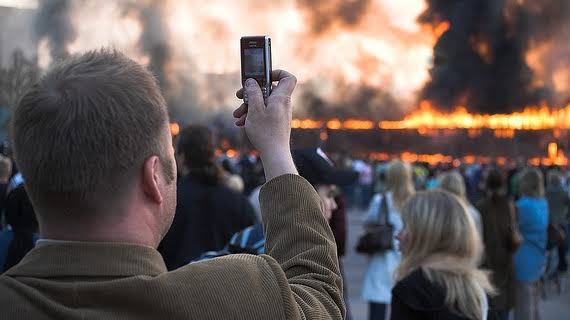- Introduction
- Brief definition of citizen journalism
- Importance in the modern digital era
- Thesis statement: Citizen journalism, the practice of ordinary individuals using digital tools to document and share events, is vital to the future of civilization as it bypasses state-controlled narratives, ensures timely dissemination of truths, mobilizes communities for justice, and fortifies democratic accountability in an age of information warfare.
- Understanding Citizen Journalism
- Difference between traditional journalism and citizen journalism
- Role of social media activism and mobile technology in shaping news
- Evolution of citizen reporting in conflict zones, natural disasters, and human rights issues
- Why Citizen Journalism is Vital to the Future of Civilization
- Encourages freedom of speech
- Gives voice to marginalized communities
- Enables instant reporting of abuse of power and injustice
- Bypasses censorship in authoritarian regimes
- Mobilizes citizens for social causes
- Documents disasters, cultural events, and emergencies in real time
- Challenges Faced by Citizen Journalism
- Spread of misinformation and fake news
- Lack of editorial oversight
- Privacy violations and sensationalism
- Threats, arrests, and violence against citizen journalists
- Absence of professional training
- Solutions to the Challenges
- Establishing citizen journalist training programs
- Collaborations between professional and citizen journalists for fact-checking
- Development of AI-based verification tools
- Legal protections and advocacy for citizen reporters
- Public awareness campaigns to identify credible sources
- Future Prospects of Citizen Journalism
- AI-assisted citizen reporting
- Growth of hyper-local journalism
- Countering disinformation campaigns and state propaganda
- Strengthening democratic accountability
- Conclusion
Citizen journalism, in its simplest definition, is the act of ordinary people—equipped with smartphones, cameras, and internet connectivity—documenting and sharing events as they unfold around them. In an age where information travels faster than any previous era in human history, this phenomenon has emerged as one of the most transformative forces in shaping public opinion and holding power to account. It has redefined the traditional boundaries of journalism by bypassing state-controlled narratives and mainstream editorial gatekeeping. Citizen journalism, the practice of ordinary individuals using digital tools to document and share events, is vital to the future of civilization as it bypasses state-controlled narratives, ensures timely dissemination of truths, mobilizes communities for justice, and fortifies democratic accountability in an age of information warfare. Without it, many stories would remain buried under censorship, and countless injustices would go unreported, leaving the global public blind to critical realities.
The distinction between citizen journalism and traditional journalism is as significant as it is necessary to understand. Traditional journalism relies on professional reporters working within established media organizations, bound by editorial policies, journalistic ethics, and institutional accountability. This model often requires lengthy verification processes and editorial approval, which, while essential for accuracy, can also delay the release of urgent information. By contrast, citizen journalism thrives on immediacy. Anyone with a smartphone and internet access can capture footage of a protest, natural disaster, or political crackdown and share it on social media within seconds. This speed of dissemination can be lifesaving—consider how videos shared during the 2004 Indian Ocean tsunami or the 2010 Haiti earthquake alerted the world to the scale of devastation long before official reports were compiled. In Syria’s civil war, citizen-generated videos became the primary source of information for the international community as many foreign journalists were barred from entering conflict zones. Mobile technology and social media platforms like Twitter (now X), Facebook, and YouTube have essentially transformed billions of people into potential reporters, collapsing the barriers between newsmakers, reporters, and audiences.
The vitality of citizen journalism to the future of civilization becomes even clearer when examining its specific contributions. One of its most profound impacts is in encouraging freedom of speech, especially in countries where speaking against authority is dangerous or outright illegal. In environments where independent media outlets are censored or co-opted by the state, citizen reporters can document human rights abuses and corruption without needing the approval of an editorial board. For example, during the Arab Spring uprisings of 2010–2011, ordinary citizens in Tunisia, Egypt, and Libya used Facebook and Twitter to coordinate protests, share evidence of government brutality, and rally international support. This wave of digital activism revealed how citizen journalism could break through decades of authoritarian control and create momentum for democratic change.
Equally important is the role of citizen journalism in amplifying the voices of marginalized communities. Entire groups—whether due to ethnicity, geography, or socioeconomic status—have historically been ignored or misrepresented in mainstream media narratives. When a farmer in rural Pakistan shares a video of crop destruction due to climate change-induced floods, or when an indigenous community in Brazil posts footage of illegal deforestation in their territory, they bypass elite-controlled media channels and speak directly to the world. This democratization of storytelling is critical to ensuring that the experiences of the vulnerable are not erased. According to a 2022 Pew Research Center study, 53% of global internet users say they have learned about a social or political issue through posts shared by ordinary people, rather than through mainstream news.
Citizen journalism also plays a crucial role in the instantaneous reporting of abuses of power and injustice. The killing of George Floyd in the United States in May 2020 might have passed into obscurity were it not for the bystander video recorded on a smartphone and uploaded to social media. That nine-minute video sparked protests in more than 60 countries, demonstrating the power of a single piece of citizen-generated content to shift global discourse on police brutality and racial justice. Similarly, in Myanmar’s military coup of February 2021, ordinary citizens live-streamed crackdowns on peaceful protests, providing real-time evidence for human rights organizations building cases against military leaders.
The ability to bypass censorship is another hallmark of citizen journalism’s importance. In authoritarian regimes where state-run media control narratives, independent reporting often becomes impossible. In China, despite heavy digital surveillance and the “Great Firewall,” citizen journalists like Zhang Zhan used encrypted platforms to share videos from Wuhan during the early days of COVID-19. Her arrest and four-year prison sentence highlight both the bravery and the risks inherent in citizen journalism. The bypassing of censorship ensures that vital truths escape into the global information stream even in the most repressive environments.
The mobilization of citizens for social causes is yet another strength. When images or videos of injustice circulate widely, they can inspire activism, donations, and policy pressure. After the devastating 2022 floods in Pakistan, countless citizens uploaded videos showing the destruction, often with calls for donations. Within days, diaspora communities worldwide mobilized fundraising efforts, supplementing government and NGO responses. Similarly, during the 2015 Nepal earthquake, citizen-generated maps and updates guided humanitarian relief teams to affected areas faster than official channels could.
Citizen journalism’s capacity to document disasters, cultural events, and emergencies in real time adds to its societal value. Whether it is footage of wildfires in California, the eruption of Mount Semeru in Indonesia, or a cultural festival in a remote African village, citizen journalism enriches the global understanding of events and fosters cultural exchange. UNESCO estimates that over 80% of breaking news footage used by international broadcasters now originates from non-professional sources.
Despite its immense value, citizen journalism faces serious challenges. One of the most pressing is the spread of misinformation and fake news. Because citizen journalists are not typically bound by professional codes of ethics or fact-checking protocols, false information can spread rapidly, undermining credibility and public trust. The COVID-19 pandemic provided a glaring example, where misinformation about the virus, treatments, and vaccines circulated widely on social media, sometimes causing direct harm.
The lack of editorial oversight compounds this problem. Professional editors not only check facts but also ensure that stories are balanced and free from libel. Without this safeguard, citizen journalism can sometimes veer into biased, sensationalist, or incomplete reporting. Privacy violations are another concern; in the race to break news, sensitive information about victims or vulnerable individuals may be shared without consent, causing further harm. Moreover, citizen journalists often face threats, arrests, and violence, especially in politically volatile regions. According to Reporters Without Borders (RSF), over 350 citizen journalists were imprisoned worldwide in 2023 alone, many without fair trials. Finally, the absence of proper training means that even well-intentioned citizen reporters may struggle with verifying facts, contextualizing events, or protecting themselves in hostile environments.
These challenges, however, are not insurmountable. Several practical solutions can strengthen the credibility and safety of citizen journalism. One approach is to establish training programs for aspiring citizen reporters, teaching them basic journalistic ethics, fact-checking techniques, and digital security measures. NGOs, universities, and even professional media houses could collaborate to create accessible online courses or workshops. Another solution lies in fostering partnerships between professional journalists and citizen reporters. Such collaborations could allow professionals to verify and contextualize citizen-generated content, combining speed with accuracy. Technology can also play a vital role; AI-based verification tools, such as those developed by organizations like First Draft and Storyful, can help authenticate images, videos, and social media posts before they are widely shared. Legal protections are equally important—governments and international bodies should adopt frameworks that protect citizen journalists from harassment and prosecution when they act in the public interest. Finally, public awareness campaigns can equip audiences with the skills to identify credible sources and cross-check information before sharing it further.
Looking ahead, the prospects for citizen journalism are both promising and complex. AI-assisted reporting is emerging as a major development, allowing individuals to translate, transcribe, and verify their content in real time. Hyper-local journalism—reporting that focuses on small communities and specific neighborhoods—is expected to grow, giving residents more control over the narratives about their own lives. Moreover, citizen journalism will be crucial in countering disinformation campaigns and state propaganda, especially in countries where political polarization and “fake news” accusations are eroding trust in mainstream media. In democratic societies, citizen reporting can serve as an additional layer of accountability, ensuring that elected officials remain answerable to the people they serve.
In conclusion, citizen journalism stands as one of the most powerful tools for ensuring that the truth, in all its complexity, survives in the 21st century. It offers speed, accessibility, and inclusivity unmatched by traditional media, while giving a platform to the voiceless and challenging abuses of power. Yet its full potential will only be realized if the challenges it faces—misinformation, lack of oversight, threats to safety—are met with effective solutions. The future of civilization depends not only on the ability to tell stories but also on the ability to tell them truthfully, ethically, and bravely. As technology continues to evolve, and as more people across the globe gain the means to report what they witness, citizen journalism will remain not just a supplement to professional reporting, but a cornerstone of democratic accountability and global awareness.
📍 English Language Educator | Blogger & Content Strategist | 7+ Years in Educational Blogging
Nosheen Bashir is a dedicated English teacher and experienced blogger with over seven years of expertise in content creation and educational writing. Passionate about language, literature, and effective communication, she combines her teaching experience with blogging skills to create insightful, research-backed content that helps learners and educators alike.
🔹 Expertise & Achievements:
✔ English Language Education: A skilled educator with years of experience in teaching English grammar, literature, and communication skills to students of varying levels.
✔ Educational Blogging: Running a successful blog for 7+ years, delivering well-structured, engaging content on language learning, writing techniques, and academic success.
✔ SEO & Content Strategy: Specializes in creating high-ranking, authoritative articles that follow Google’s EEAT principles, ensuring content that is both informative and search-friendly.
✔ Student-Centric Approach: Committed to making English easier, engaging, and accessible, helping readers and students improve their language proficiency.
🚀 With a passion for teaching and writing, Nosheen Bashir is dedicated to crafting educational content that empowers students, teachers, and language enthusiasts worldwide.








